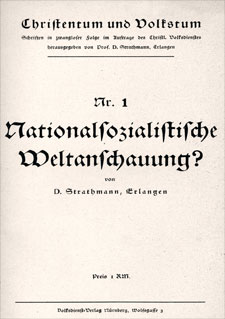Hermann Strathmann: A Conservative Opponent
Hermann Strathmann (1882–1966) had taught New Testament at the university in Erlangen since 1918. The university in Erlangen was the leader in the education of young Bavarian theologians. A nationalist, antidemocratic climate prevailed there during the Weimar Republic. The faculty of the School of Theology did not support the republic, either. A large majority of the Protestant theology students were filled with enthusiasm for National Socialism from the end of the 1920s onward. Over one third belonged to the National Socialist Students’ Association in the winter semester of 1930-31.
Strathmann became heavily involved in partisan politics and as an active politician. He had been one of the co-founders of the right-wing conservative Bavarian Center Party in 1918 and became active in the German National People’s Party in 1920. He became a member of the Bavarian parliament in 1919 and a member of the Reichstag for the electoral district of Franconia as of 1920. In 1930, he switched to the Christian Social People’s Service in which he assumed a leading role. He held seats in the Reichstag once again for the People’s Service from 1931 to March 1933. He considered parliamentarianism to be incapable of solving the political problems and hoped for a strong leader. He disapproved of National Socialism, however, since he considered Nazi racial ideology to be irreconcilable with Christianity.
Following the NSDAP’s gains in the Reichstag elections of 1930, Strathmann intensively examined Nazi ideology in his treatise Nationalsozialistische Weltanschauung?. His starting point was the question of how the NSDAP could both profess its belief in “positive Christianity” in its party platform and lay claim to being a new weltanschauung. Strathmann additionally established that the concept of race was the greatest value at the heart of Nazi weltanschauung. From a Christian point of view, however, this could not be called anything other than “deification of living beings” (H. Strathmann, Weltanschauung, 10) and had to be rejected categorically (26).
Although Strathmann fundamentally approved of fighting to defend against the corrupting effects and severe harm, which rootless Judaism amounts to for our nation, and keeping our ethnic peoplehood pure, he condemned the Nazis’ unscrupulous, fanatical anti-Semitism. It was a consequence of that worship of race elevating its own ethnic peoplehood to the value of all values, which simply cannot be reconciled with the spirit of “positive Christianity” (24f.). No less reconcilable with the Christian point of view was the notion of eliminating weakly children who have entered life. The sentence: “Thou shalt not kill” quite simply applies here (22).
Strathmann’s analysis of leading Nazis’ writings and statements led him to conclude that, in all of these statements, the Nazi platform’s “positive Christianity” had been utterly debased and deprived of any meaning by the völkisch reservation arising from the concepts of race (37). Following the Nazi seizure of power in 1933, Julius Streicher (1885-1946), Gauleiter of Franconia, and students at the university in Erlangen, who were members of the SA, attempted to have Strathmann dismissed from office for “political unreliability” because of his public opposition to Nazi racial ideology and his active involvement in partisan politics during the Weimar Republic. He was able to avert his dismissal, though.
Source / title
- © Evangelische Arbeitsgemeinschaft für Kirchliche Zeitgeschichte München, KK B 865:9

